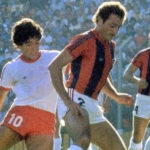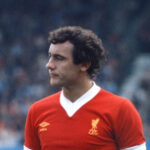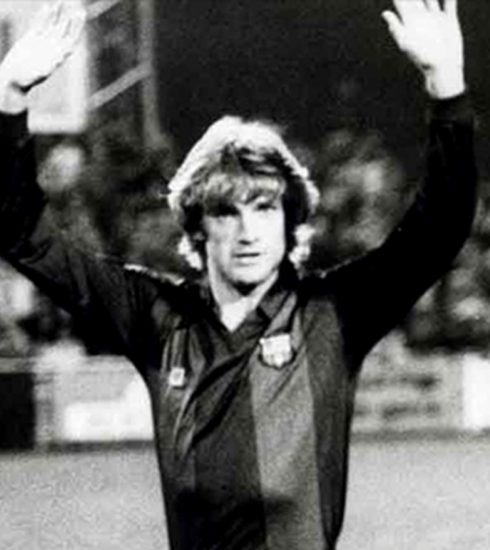RAY KENNEDY: They have not forgotten me



“That there was something wrong with my body I had known for a long time.
I had just arrived at Arsenal when I suddenly noticed at the end of a training session that I was struggling to button my shirt.
A little tremble in my right hand, which simply didn’t want to obey my brain and stick those damn buttons in place.
Shortly afterwards the same thing while trying to tie the laces of my boots.
A little tiredness, I thought, or maybe a knock on my arm that had soreened a muscle.
When you’re twenty you don’t think about such things!
At that age you feel strong, invincible, like the characters in American films.
… you can’t imagine that those are in fact the first signs of PARKINSON’s disease.
Besides, I had other things to think about.
I had become a professional footballer!
And not just any club … ARSENAL FC.
When I look back on those days I can’t help but feel a great sense of pride.
I had played for Port Vale as a kid. A ‘certain’ Sir Stanley Matthews had wanted me at the club.
The same one who after a little over a year gave me the boot.
“You’re too big, slow and ungainly. You’ll never make a living at football, son’, were more or less the words Sir Stanley Matthews used to liquidate me.
It was not at all easy to assimilate this disappointment.
But then again, who am I to refute the words of one of the greatest footballers in my nation’s history?
So I went back to my neck of the woods in the North East of England.
Awaiting me was a blue collar job in a confectionery company and a striker’s jersey in a small but fierce junior team, the New Hartley Juniors.
There I started having fun again and scoring lots of goals.
Paired with me in attack was Ian Watts, who had played for the England Under-14 national team a few years earlier.
One day a scout from Arsenal came to see us.
When they moved from London to come up there it meant that something big was boiling in the pot!
In our part of the world the most talented guys invariably ended up in the ranks of Newcastle, Sunderland or Middlesbrough.
The problem was, the scout hadn’t come all that way for me.
He had come to see Ian.
After the game I saw the scout stop to talk to our chairman and another manager.
I thought it was done for my comrade.
Instead, two days later I was summoned to the clubhouse and told that a contract with Arsenal was ready.
OK, it was only a youth contract but I felt like I was going crazy with joy.
Not even six months later I signed my first professional contract.
Those were great years with the Gunners.
At 18 I made my first-team debut and a few months later the incredible satisfaction of scoring a goal in the Fairs Cup final. We were playing in Brussels against Anderlecht and we were losing 3-0.
And it was me, on the pitch for five minutes in place of Charlie George, who scored that goal which became decisive as we buried them 3 goals to 0 in the return leg at Highbury.
Every now and then, though, ‘my friend’ would come back and send me more signals.
But I simply didn’t want to see them.
Excessive sweating, my right arm and leg tingling from time to time, and then tiredness… sometimes I would finish training and matches completely exhausted.
Bertie Mee, the manager who only three years earlier had led us to the ‘double’ (a league and cup victory) was no longer particularly happy with me.
And so in the summer of 1974, even though I was only 23, I had to leave the Gunners.
They cashed in a good £200,000 which was a lot of money in those days!
And it was certainly not a step backwards in my career … quite the contrary.
Bill Shankly’s Liverpool wanted me.
I was delighted to arrive at a team of that calibre and with a fantastic coach.
The Reds had just won the FA Cup and had already been at the top of English and European football for a few years.
What happened, however, as soon as I signed for the Reds at Anfield, I really didn’t expect!
Bill Shankly, displacing all the people in the red half of Liverpool, resigned.
And so I found myself in a new team but without the manager who had wanted me so badly.
For more than a year I just couldn’t find space in the first team.
Liverpool was a strong, established team.
In attack played that phenomenon Kevin Keegan and alongside him was the Welshman John Toschack with whom he had built an almost telepathic understanding.
A few appearances now and then, a few goals but never continuity in the first team.
Then finally came the day when everything changed, drastically and definitively.
It’s 1 November 1975. We’re playing Middlesbrough away from home.
In the previous game Peter Cormack, our left-sided midfielder, was injured.
Bob Paisley decides to give him his jersey, the one with the number 5.
“I know you’ve always played as a striker son, but in my opinion you’ve got what it takes to be a very good midfielder.
… I would have even played in goal to get on the pitch with the starters!
We win that game (with a single goal from Terry McDermott) but from that day on we string together a run of 17 games where we only lose one game.
And we are right back in the title game.
But what matters most is that the number 5 jersey is now mine and no one will take it away from me for several seasons to come.
We win that championship on the last day.
With a quarter of an hour to go we’re losing narrowly to Wolverhampton but three goals in the final give us the first trophy of the Paisley era.
Fifteen days later we also win the Uefa Cup, going on to draw away from home against Belgian side Bruges after we had beaten them narrowly at Anfield.
The great Liverpool cycle had begun and until 1981 I was an integral part of it.
In that year we won our third European Cup.
From that day on, however, everything that could go wrong went wrong.
Liverpool unceremoniously knocked off my friend Jimmy Case (how many things we did together!) and ‘my other friend’ began to hang around with me more assiduously.
There were good days where he left me alone and others where he tortured me mercilessly.
Sometimes after half an hour of training I was as tired as someone who had run a marathon can be.
I no longer had my fixed place in the team.
The team was changing skin, new players were coming in and the results were more or less like my fitness: fluctuating.
My old team-mate John Toschack (the one who was so good that he forced me to change roles!) who had meanwhile become player-coach at Swansea, did the miracle of taking it from the Fourth to the First Division in just four seasons.
Not only that.
That season, 1981-82, when I arrived at Swansea in January, it seemed that the Welsh team had a much better chance of winning the title than my former Liverpool team-mates.
And when we beat them without appeal at Vetch Field on 16 February I was convinced I had made the right choice.
Then things started to go wrong for us.
And wonderfully well for the Reds.
We lost seven of our last 12 games and finished no higher than an honourable sixth.
Liverpool, on the other hand, won 13 of their last 16 games (the other three in this series ended in draws) winning the title with one of the most extraordinary comebacks ever seen in the history of English football.
‘My friend’ meanwhile came to visit more and more often.
In the following season Toschack even gave me the captain’s armband.
I was flattered and happy but I couldn’t give what I was used to giving when I took the field.
In some games I felt like I was going in slow motion so much fatigue.
They even accused me of indolence, lack of commitment and disinterest in the team.
I don’t blame them.
No one could know what was happening to my body.
But I could not accept these accusations.
I rebelled, I felt hurt in my pride as a professional, as a footballer and as a man.
But I simply could not give more.
I was stripped of my captain’s armband and even received a fine and for a fortnight I was even put out of the team.
They put me on the transfer list in March 1983 but by then there was no queue outside the president’s door demanding my services.
We were relegated to the Second Division.
In October we agreed to end the contract.
I made a few attempts as a coach-player in smaller teams.
I even went to Cyprus.
All to no avail.
In November 1984 I was diagnosed with Parkinson’s disease.
Now at least ‘my friend’ had a name.
My career, at the age of 33, was already over.
Some ‘real’ friends, like Lawrie Mc Menemy, the Sunderland manager, offered me a place on his staff.
A few peaceful months but ‘my friend’ was becoming more and more overbearing and aggressive.
One good day and three bad guys.
I locked myself inside the walls of my house.
When you are in this condition and people remember how you were ‘before’ it is not pleasant.
I was angry at the whole world and wanted to destroy everything.
And I was good at it!
I ‘succeeded’ in getting my wife to leave me, on whom I had unloaded my frustration and anger for years. She left, taking Cara and Dale, my two children, with her.
The money ran out quickly.
I wrote an autobiography, together with one of the few friends I had left, Dr Lees, the same one who had treated me.
I had to sell all my trophies and medals and now I get by with the help of the Professional Footballers Association.
I was destitute, sick and without any prospects.
Then a miracle happened, the kind that happens every now and then … maybe just when you don’t believe in it anymore.
Some guys from Liverpool (they told me I was their idol) got together, founded an association, the ‘Ray of Hope Appeal’.
I didn’t think there were still people who remembered me … and loved me so much.
Karl Coppack and his friends not only raised funds and helped me with medical bills, food and basic necessities.
No, they did much more.
They decided to take me with them to Anfield Road.
On the very day of Liverpool-Arsenal.
I didn’t know what kind of day it would be for me … good ? The kind where ‘my friend’ leaves me alone and I can still look like a ‘normal’ human being ?
Or the ones where even getting out of bed became like climbing K2?
Those guys cheered me on, held me up and supported me.
“My children, I thank you from the bottom of my heart, but who do you want to remember me ?” I told them.
I was afraid. I won’t deny it, afraid of arriving there and seeing the same faces I see the few times I venture out of the house to buy the newspaper or a bottle of milk.
And instead what happened was what I never, ever imagined …
The crowd on their feet shouting my name, singing ‘you’ll never walk alone’ all for me, the Kop with an immense number 5 and on the other side the Gunners fans with my ’10’.
They didn’t forget about me.
Even though it is now 2009 and almost 30 years have passed since those wonderful days.
Now I can finally cry with joy and I’m sorry “my friend” … you just can’t stop me.
Ray Kennedy was one of the greatest players in the history of English football over the last 50 years.
He won everything that could be won and he did it with his class, his football intelligence, his ability to disengage in virtually every midfield and attacking role.
As long as the terrible Parkinson’s disease allowed him to do so, he was one of the most consistent and continuous players in performance that British football can remember.
The great Bob Paisley, his coach during his fantastic years with the Reds, said of him in his autobiography: ‘It is my opinion to say that Ray Kennedy was one of the greatest footballers in Liverpool’s history … and in all probability the most underrated’.
ANECDOTES AND TRIVIA
As recounted in the first part Ray Kennedy when he was at Port Vale was discarded by Sir Stanley Matthews, his coach at the time.
Too big and slow. This is how the great winger of the English national team had described him.
“Indeed, I had some doubts myself. During a training session we were doing 50-metre sprints. I was really trying hard … when I saw Sir Stanley running past me practically at double speed.
I was 16 and he was 51…”
To be discarded by one of the greatest players in English football history could have shaken the confidence of several 16-year-old boys.
Not Kennedy’s, who indeed still remembers that brief time at Port Vale with pleasure and pride.
“It was an honour for me to have shared so many hours on a football pitch with a legend like Sir Matthews. And so many things I learned then came in very handy later in my career”.
For several years Ray Kennedy had to coexist, not without difficulty, on the left flank with his namesake Alan, who arrived at Liverpool in 1978, four years after Ray.
The two for several years shared the Reds’ left flank.
Alan as a full-back and Ray in front of him as an outside midfielder.
Problematic cohabitation to say the least!
Recalls Ray of that time.
“I would go up to him and he would throw the long ball. I would go deep to dictate the pass and he would play it short. It was desperate!”
At one point when they asked me which of the two Kennedys I was, I’d say, “The smart one,” amused Ray.
Alan loved to push forward at every opportunity while Ray hated having to get back into the defensive phase to double and ‘filter’.
Only with Alan’s constant attacks it was often Ray’s turn to cover him, exhausting himself in defensive coverages to such an extent that one day Ray said to his namesake “Alan if I hadn’t met you on my path I could have played at least five years longer!
Alan Kennedy’s own recollection “Ray was not an easy guy. He had great self-confidence. More than me, Souness, Case and Dalglish combined. But he was a real man. On the pitch he never hid himself, in fact … as soon as I arrived at Liverpool he said, ‘Alan, when you’re in trouble don’t panic, don’t throw it away. Give it to me I’ll get us out of trouble”.
During his time at Liverpool Ray formed a great friendship with Jimmy Case, the tough Reds midfielder with an impressive shot.
They were always together … often messing around in some pub or club.
“They called us Batman and Robin so much we were inseparable,” he says.
“Only together we almost always did nothing but trouble. Fines, court summonses and even a few days in jail. Staying out of trouble was impossible for the two of us.”
Ray Kennedy continues in his recollections.
“On trips we slept in the room together. Jimmy was a sleepyhead while I liked to stay up late and chat. As everyone knows Case was deaf in one ear. His biggest concern when choosing his bed was to make sure that he had the ear from which he was deaf towards me so that he could still fall asleep while I kept talking!”
To this day, their relationship is still very close and not a day goes by without Jimmy’s honesty about Ray’s condition.
A few months after this tribute Ray Kennedy went to heaven. Waiting for him was his friend and companion of many victories, Liverpool’s other ‘Ray’, goalkeeper Clemence.
Rest in peace and … hope there is an “Anfield Road” up there too.







Barry Medwin⅕
9 mesi agoMy father Terry was assistant manager and coach, to John Toshack at Swansea 1978/85. Dad witnessed first hand Ray Kennedy deterioration physically, in training sessions and matches. Dad was sympathetic, but at that stage Parkinsons was not diagnosed. Great player. RIP Ray 🙏